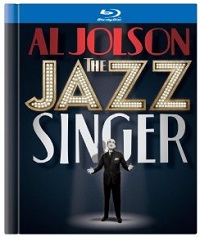
Tarantino and Spike Lee's Favorite Movie?
The Film
More than eight decades have passed since the theatrical release of The Jazz Singer and I must admit that I nearly spit out a mouthful of Boylan's Creamy Red as I read the disclaimer from Warner Brothers on page one of their otherwise brilliant booklet. That Warner felt the need to apologize for the racially insensitive material from the period included in the Blu-ray release was just weird; especially in an era of filmmaking where Quentin Tarantino can get away with using "nigga" more than 100 times in Django Unchained.
The original film (versus the weird one with Neil Diamond), whose success helped turn Warner into a major studio back in 1927, was an accurate reflection of the period and it's unlikely that anyone who views the film in 2013 is likely to run from the room screaming for the ACLU. If Al Jolson singing in blackface is offensive, then I have to wonder where one draws the line as modern cinema has enough sex, nudity and violence to require 10 pages of disclaimers on each release.
Al Jolson stars as Jakie Rabinowitz/Jack Robin, a nice Jewish boy from New York who doesn't want to continue the family tradition of being a great cantor like his papa (played by the legendary Warner Orland, who made a career out of playing Charlie Chan -- not bad for a kid from Sweden). When Jakie is kicked out of the house because he would rather sing jazz tunes than daven "Kol Nidre," he is forced to pick between the traditions of the old world and the exciting new world that awaits him.
Al Jolson was a huge star before the film was even in production, but the success of the first talkie turned him into a screen legend. Moses took the Jews out of Egypt. Jolson carried Hollywood across West Pico, and the film world became the multi-billion dollar industry that exists today.
A monumental film with wonderful music that started it all.
The Picture

The transfer does suffer from some issues with flicker rate and some choppy transitions, but the reduction in noise more than makes up for it. When Jolson dons his infamous blackface and the camera tightens on him, you really do finally realize that he was 40 when the film was made; thanks to the improvement in clarity and detail.
For a film nearing its 90th birthday, it looks remarkably good; far better than some other classics from the period that were left to degrade in studio vaults.
The Sound
It is quite easy to be underwhelmed by the audio experience when watching this film, especially in the era of Dolby Atmos. However, when placed in its historical context, The Jazz Singer is something to behold. Imagine the audience in 1927 hearing synchronized dialogue and music for the first time. The response must have (and it did) set the auditorium ablaze with gasps. While the format would ultimately prove impractical (for both financial and technical reasons), it didn't just open the floodgates; it knocked over the entire dam (think Superman).
The DTS-HD Master Audio mono track isn't the cleanest and nor does it contain any surround material to amaze your friends. When Jolson sings, you'll want to crank the volume a bit just to make sure you capture all of the raw emotion and joy that he poured into his music.
Warner has done an admirable job cleaning up the mix and one can only imagine what it was like to hear it reproduced in 1927 through a Western Electric system.
The Extras
If you thought Lawrence of Arabia came with an impressive collection of bonus materials, you'll be even more thrilled by the encyclopedia of content that Warner Brothers has included with the release of The Jazz Singer. Between the 24 shorts from the period that offer a rare look at the evolving technology and some truly wonderful documentaries, this is a release that will educate, as well as just entertain.
The Vitaphone format would evenually lose out to the sound-on-film process, but for a short period of time, moviegoers were able to experience a level of fidelity while viewing a feature film that had previously not be available. The bonus material includes three shorts and documentaries about the history of the format and how it helped transform cinema.
The supplied 90-page booklet contains rare photographs, lobby cards, collector cards, a souvenir program, and a post-premiere telegram from Al Jolson. Everything you ever wanted to know about the period, Jolson, and the history of Vitaphone is included.
Final Thoughts
Regardless of your feelings about the film's controversial racial insensitivity, The Jazz Singer is one of the most important films ever made, as it ushered in the era of synchronized dialogue and music in a feature film. Filmmaking has never been the same and moviegoers owe Warner Brothers a huge debt of gratitude for their monumental decision. The Blu-ray release is a treasure chest of cinematic history and one of the most important home video releases ever. Be prepared to be both dazzled and shocked by this bold film that made it possible for the medium to become as large as it is today. Highest recommendation.
Product Details:
Where to Buy:
| Overall | |
|---|---|
| Video | |
| Audio | |
| Movie | |
| Extras |